If you’re worried about the language barrier in Japan, you’re not alone. This guide lists essential words and basic Japanese phrases you can use on your trip, as well as helpful tips for communicating in Japan.
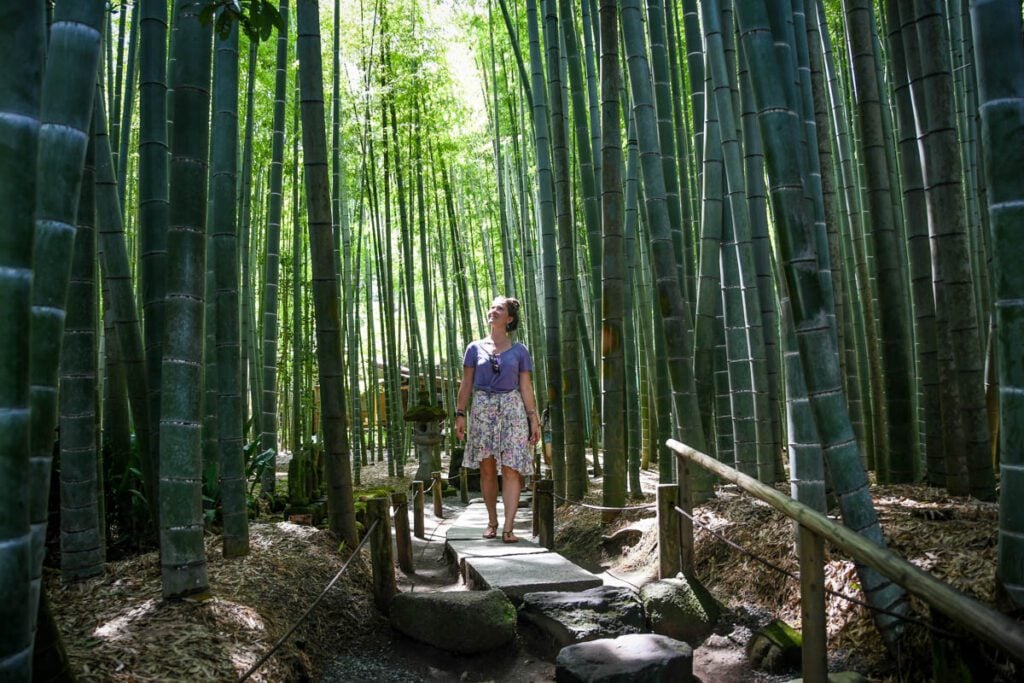
One of the most common questions we get asked about traveling to Japan is how we deal with the language barrier.
Honestly, it hasn’t been too much of an issue for us, even though we’ve traveled to some off the beaten track parts of Japan.
Whenever we travel to a new country, we try to learn a handful of important words and phrases so that we can make an effort to communicate with locals.
Top Japanese travel phrases & words to know
We have many more words and phrases listed below, but if you want a quick list at your fingertips, here you go!
- Hello: Konnichiwa (also means “good afternoon’)
- Good morning: Ohayō gozaimasu
- Thank you: Arigato gozaimasu (the “u” on the end of the word is almost silent)
- Excuse me: Sumimasen
- Cheers!: Kanpai!
- Delicious: Oishī
- Cute: Kawaii
Quick tips for learning Japanese words before your trip
- We practiced a bit using the free version of Duolingo (which I’d recommend starting a few months before your trip if possible). I thought it helped a lot!
- We printed a list of the phrases we use most while traveling. We’ve written down our list in this article so you can do the same! We didn’t want to overwhelm you with all sorts of phrases, so we tried to keep it to the most practical and useful ones.
- We have the Google Translate app on our phones and downloaded the Japanese language “pack” before our trip. It is a lifesaver!
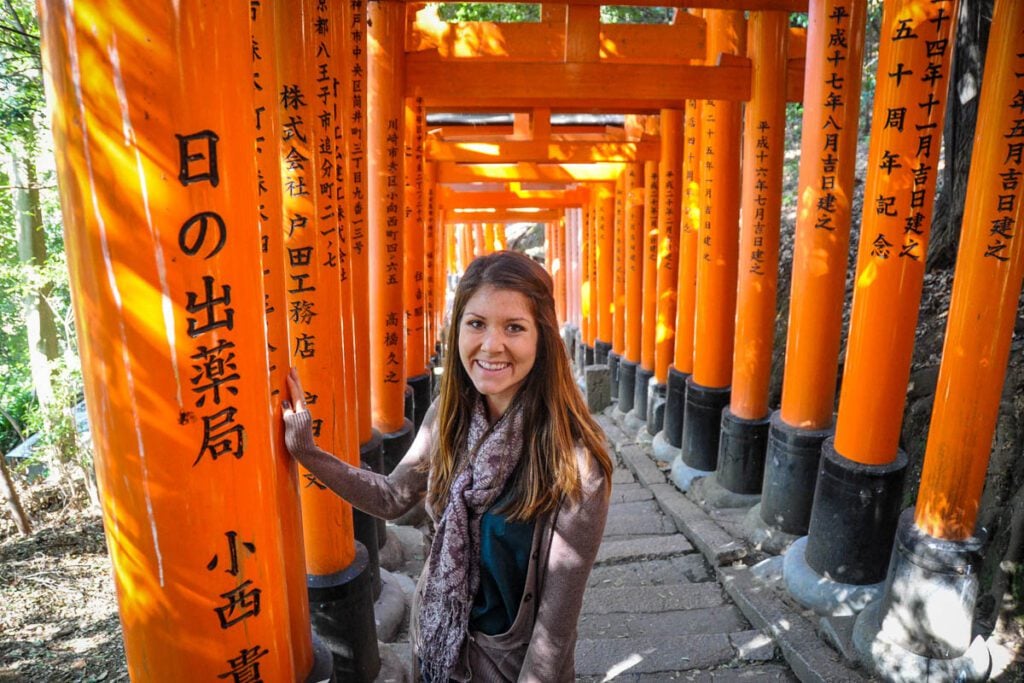
Japanese words & phrases guide
If you’re looking for a specific word, phrase, or topic, then click on the link below to jump to that section. Otherwise, keep scrolling for all kinds of useful Japanese words and helpful tips!
- Practical Japanese words
- Japanese phrases for traveling
- Numbers in Japanese
- Tips for communicating in Japan
- Japanese language FAQs
- Japanese words that don’t have an English translation
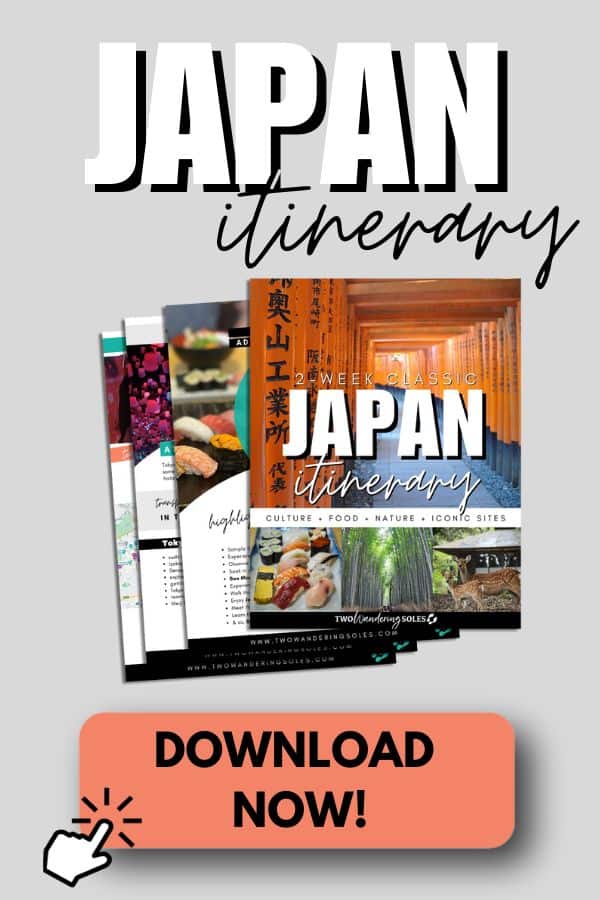
Want to save time and energy on planning?
We’ve spent hundreds of hours (no joke!) researching for our 3 different trips to Japan, and we’ve been able to explore a lot of what this country has to offer!
We’ve compiled our experience to create a classic Japan itinerary that hits the top destinations for first-time visitors. Our itinerary is spread out over 2 weeks and includes the highlights of Tokyo, Mount Fuji, Osaka, Kyoto and more!
We’ll send you our complete 2-week itinerary, filled with tips and advice. Just click below to get your classic Japan itinerary today!
Practical Japanese words to know
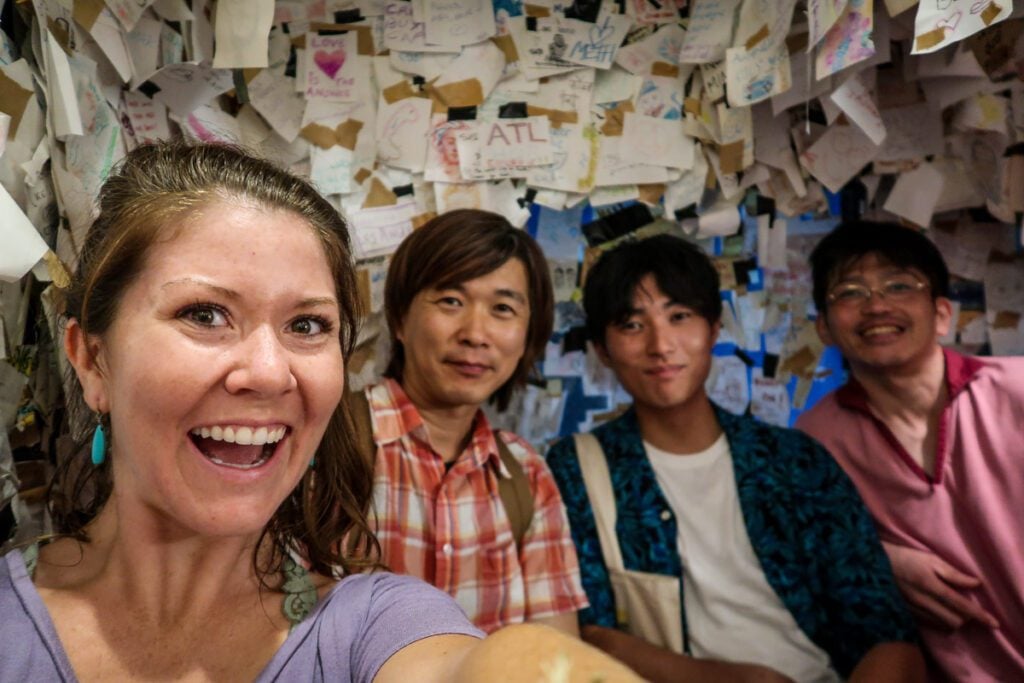
- Hello: Konnichiwa (also means “good afternoon’)
- Good morning: Ohayō gozaimasu
- Thank you: Arigato gozaimasu (the “u” on the end of the word is almost silent)
- Excuse me: Sumimasen
- Cheers!: Kanpai!
- Delicious: Oishī
- Cute: Kawaii
- Green tea: oh cha
- Water: mizu
- Rice: gohan
Japanese words about places
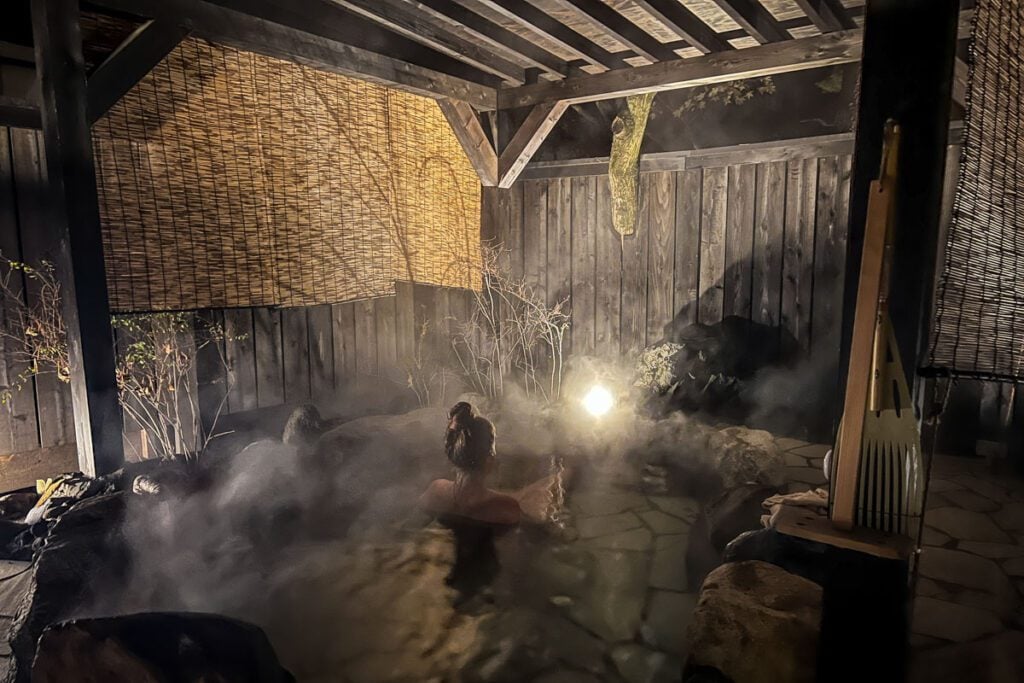
- chaya = teahouse
- ryokan = traditional Japanese guesthouse
- minshuku = family-run Japanese B&B similar to a ryokan but generally more affordable
- shoji = traditional doors, windows, or room dividers that are made using a wooden frame and heavy translucent paper
- onsen = Japanese hot spring
- sento = indoor bathing facilities that are artificially heated (i.e. not from geothermal activity)
- rotenburo = open-air onsen
- izakaya = small, casual bars that serve drinks and snacks
- yokocho = alleyway
- konbini = convenience stores
Japanese words about food
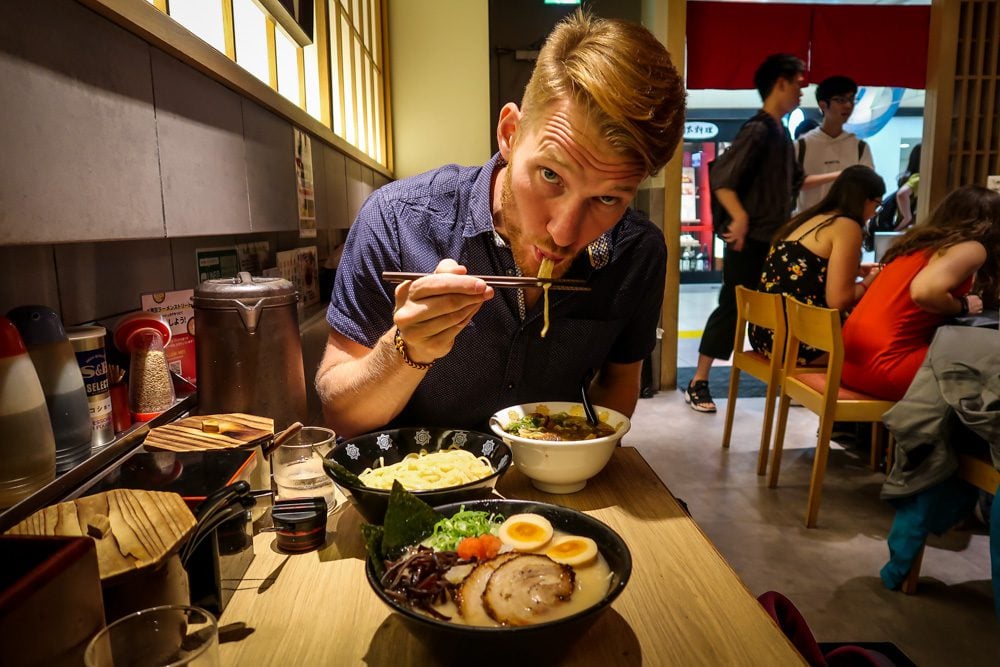
- asa-gohan = breakfast
- hiru-gohan = lunch
- ban-gohan = dinner
- oyatsu = snack
- otooshi = a welcome appetizer often served at nicer izakayas
- Occasionally you will see a small fee for this on your receipt. This is basically the “table fee” and the otooshi is complimentary.
- wagashi = traditional Japanese sweets
Don’t miss this! We have a glossary of food terms in our guide to Japanese cuisine, along with tons of useful phrases to know.
Japanese words for transportation
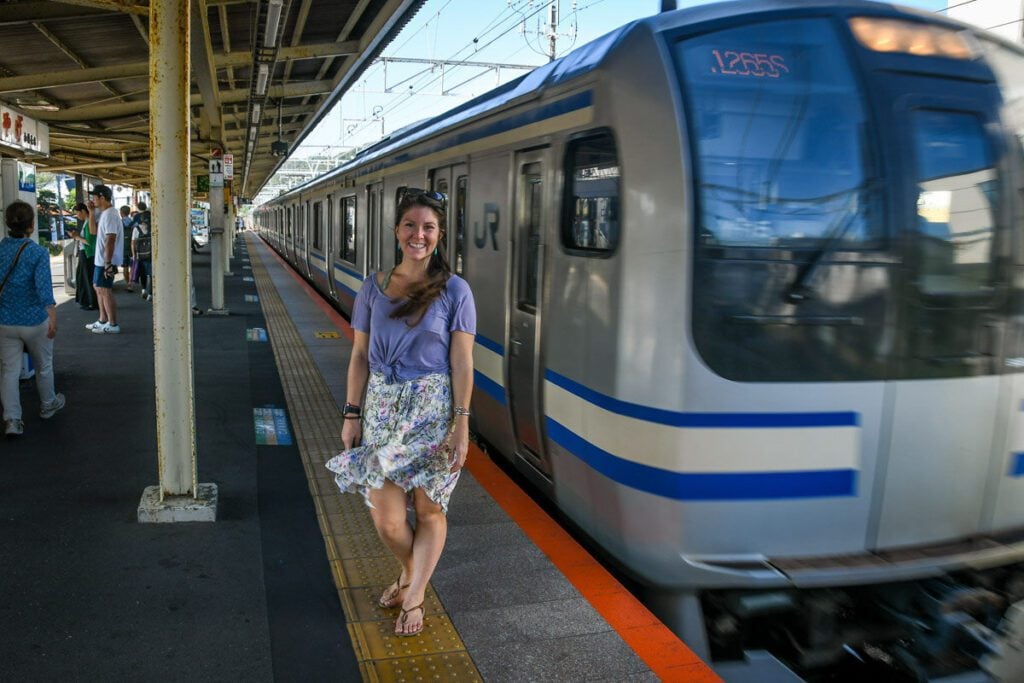
- kuruma = car
- basu = bus
- densha = train
- chikatetsu = subway, metro, underground train
- shinkansen = bullet train
- takushi = taxi
- jitensha = bicycle
- seki = seat
Japanese cultural words
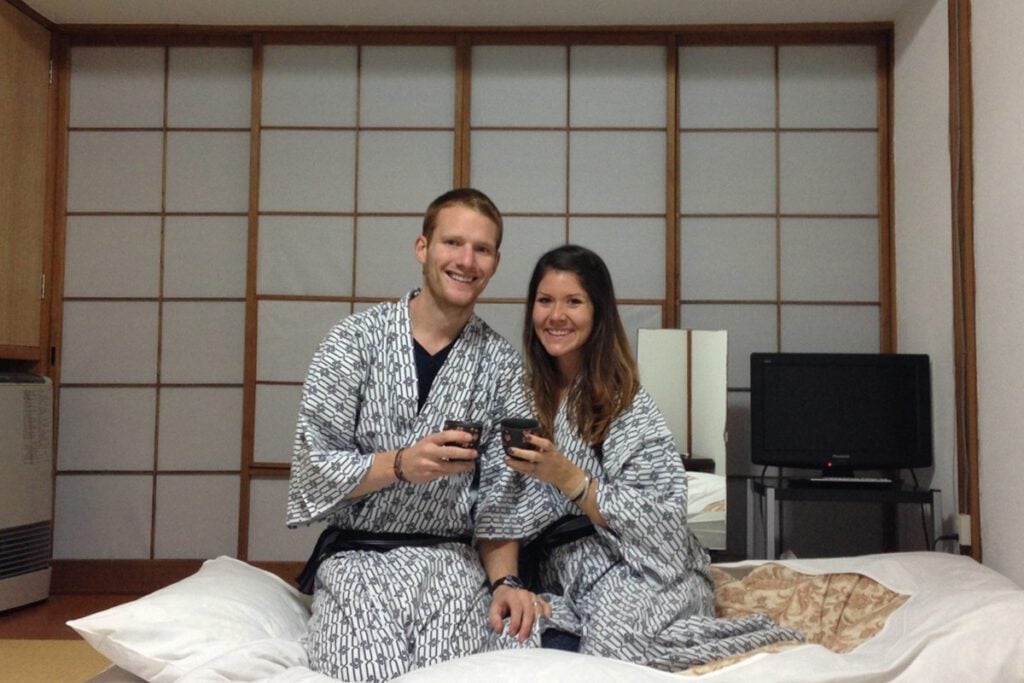
- kimono = traditional garment usually made of silk with two collars worn for special occasions
- yukata = casual traditional garment typically made of cotton with one collar
- geta = wooden sandals worn with kimonos
- jinja = shrine (Shinto religion)
- A Shinto shrine will contain a main hall (honden), a worship hall (haiden) and an offering hall (heiden), which may be separate buildings or separate rooms in the same building.
- kami = guardians or protecting deities (Shinto)
Good to know: Buddhist temples in Japan are typically denoted with the suffix -dera or -ji (for example, Kiyomizu-dera in Kyoto or Senso-ji in Tokyo). The suffix -in usually indicates a sub-temple.
Japanese words for weather & seasons
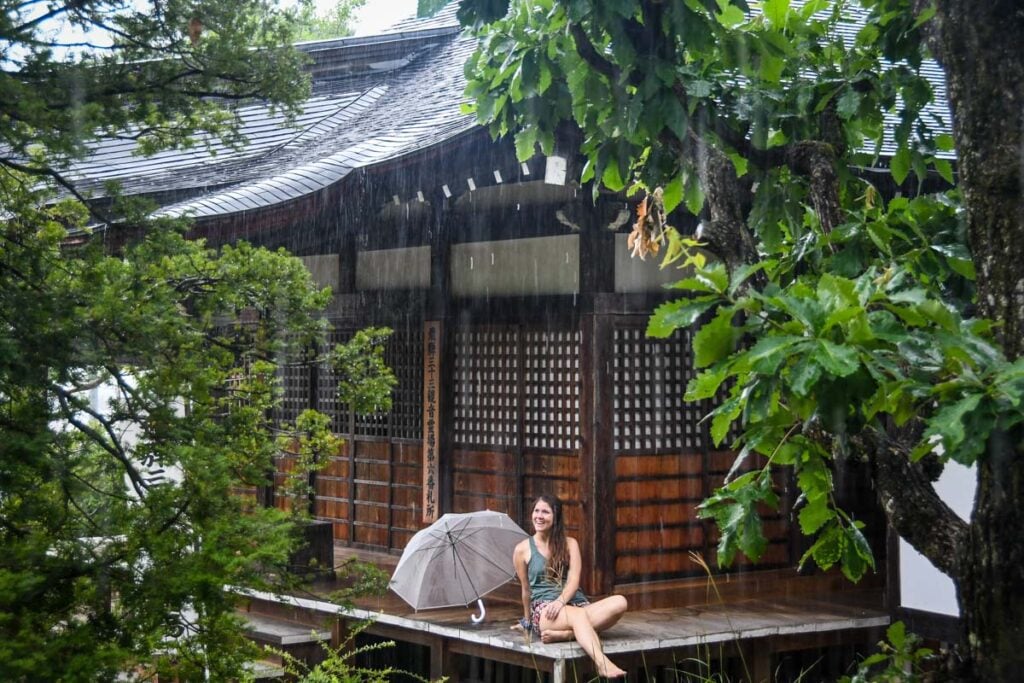
- hare = sunny
- amefuri = rainy
- kumori = cloudy
- yuki = snow
- taifuu = typhoon
- atsui = hot
- samui = cold
- haru = spring
- natsu = summer
- aki = autumn
- fuyu = winter
- sakura = cherry blossoms
- The tradition of cherry blossom viewing is called hanami
- momiji = Japanese maple leaves
- Momijigari translates to “red leaf hunting”, basically the fall equivalent of hanami
- The term kōyō refers to the process of leaves changing colors during the fall
Japanese words about nature
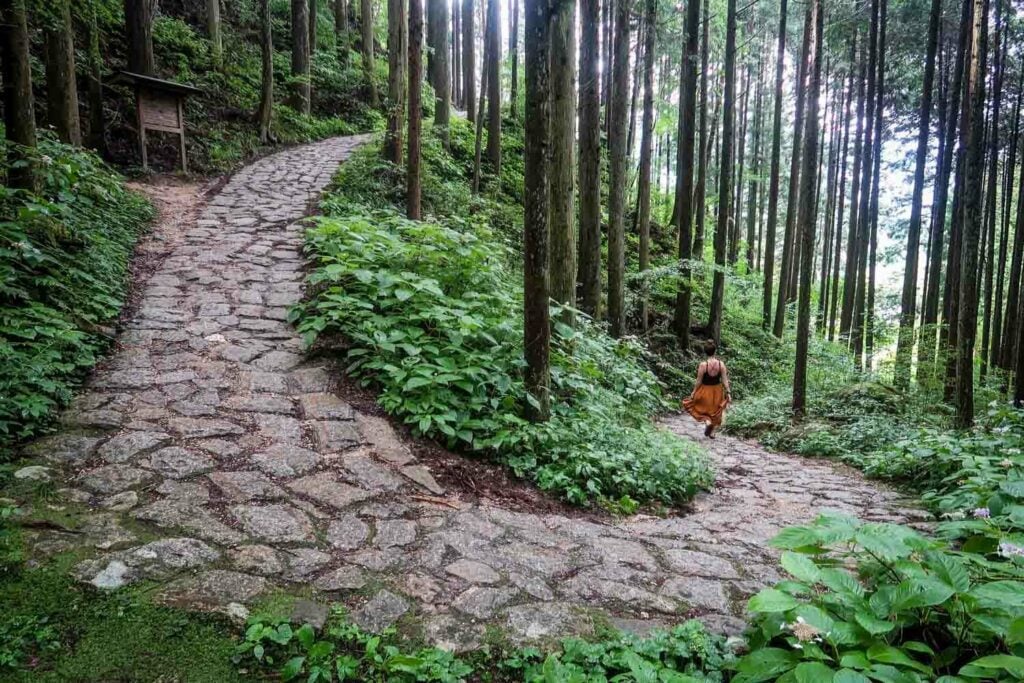
- yama = mountain
- Some mountains are also denoted with the suffix -san (e.g. Fujisan)
- shizen = nature
- umi = sea
- kawa = river
- taki = waterfall
- hana = flower
- take = bamboo
- haikingu = hiking
- kōen = park
Miscellaneous Japanese words
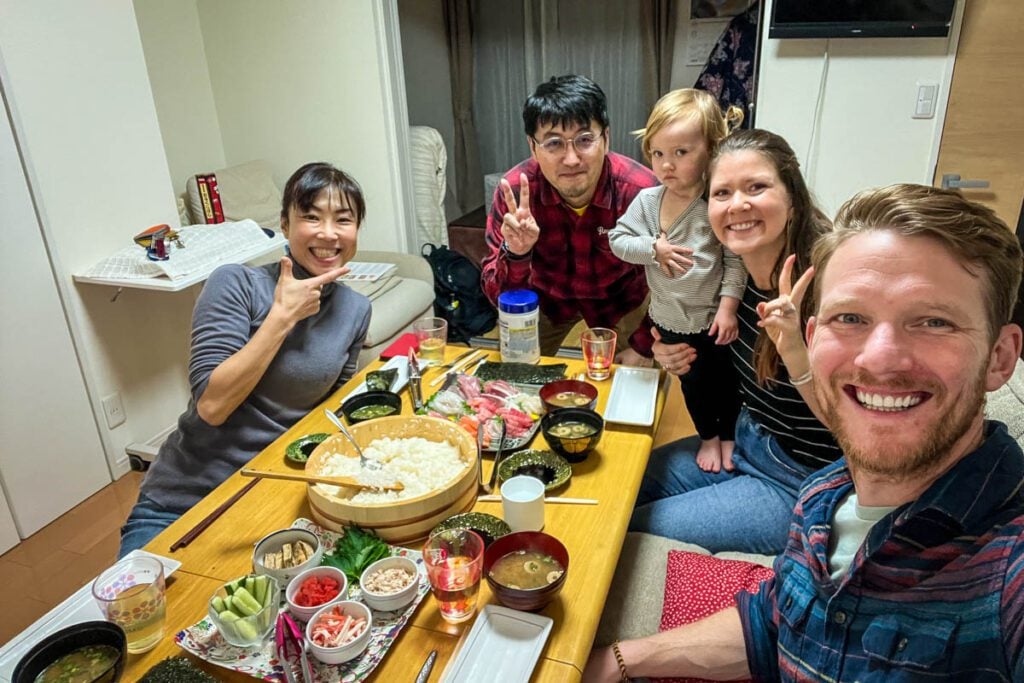
- gaijin = foreigner
- purikura = Japanese photo booth
- pachinko = Japanese arcade game that is kind of like a cross between a slot machine and pinball
- omiyage = small gifts or souvenirs; more specifically, local or regional products that represent a place
- It is customary for Japanese people to pick up omiyage (e.g. food items) on their travels to give to their friends, family, and colleagues back home.
Japanese phrases for traveling
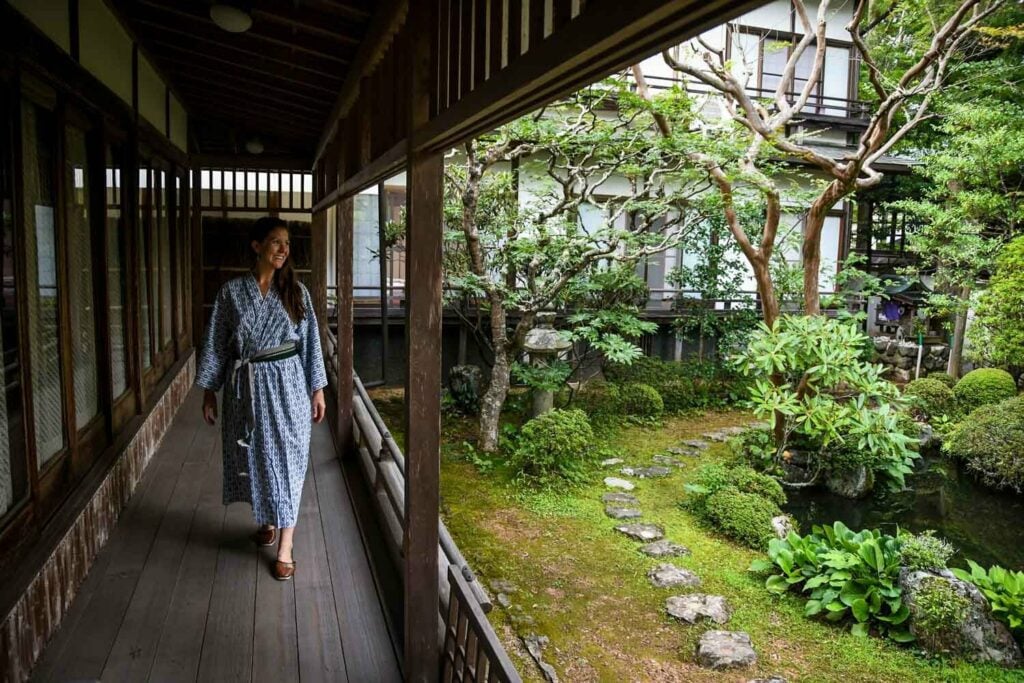
Basic travel phrases
- My name is _______.
- Namae wa _____desu.
- 名前あ___です。
- Nice to meet you
- hajimemashte
- はじめまして
- I am from _______.
- _____ desu.
- _____ です。
- I don’t understand
- wakarimasen
- 分かりません
- I don’t speak Japanese
- nihongo o hanashimasen
- 日本語を話しません
- Do you speak English?
- eigo o hanashimasu ka?
- 英語を話しますか?
Restaurant phrases
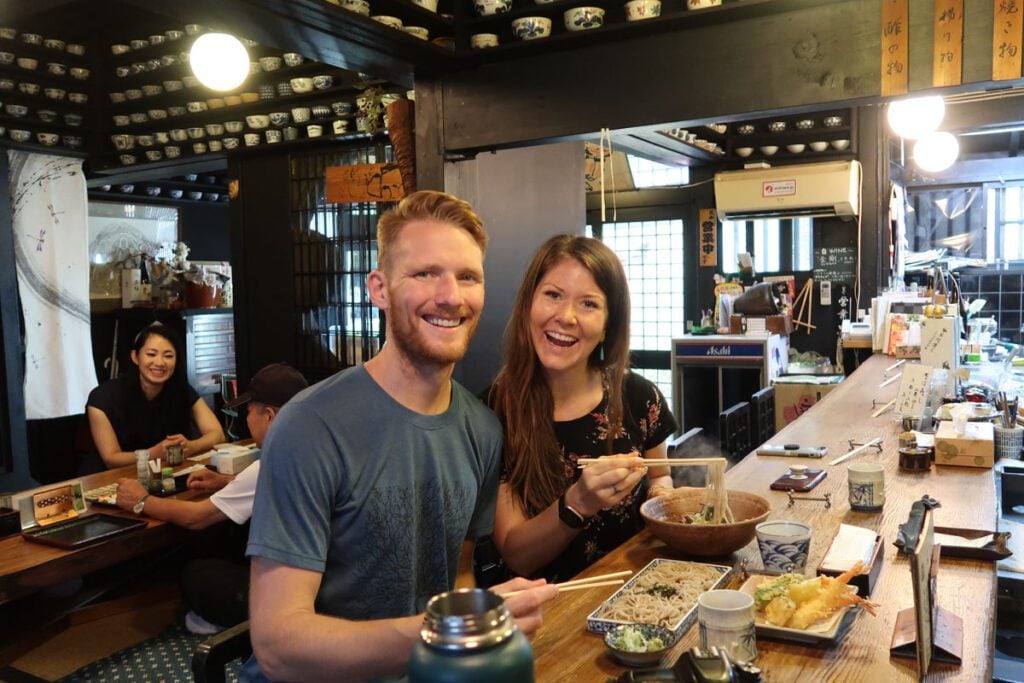
- Table for two, please.
- futari no tēburu o o-negai shimasu
- 二人のテーブルをお願いします。
- Could we have the bill, please?
- Okaikei kudasai.
- お会計ください。
Phrases for getting around
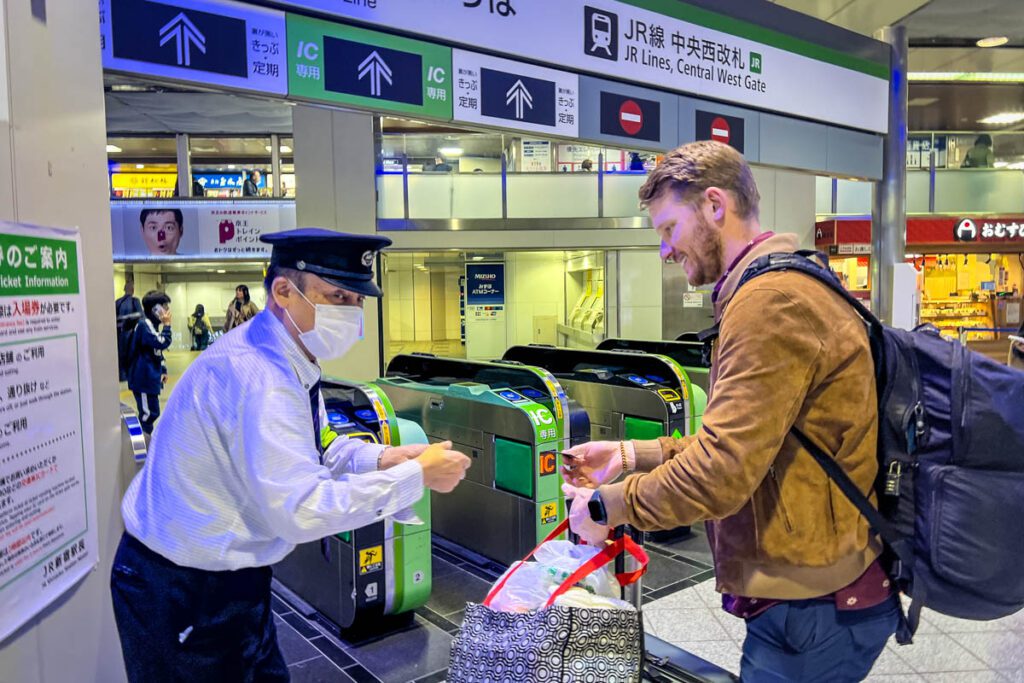
- I want to go… (here)
- (koko) ni ikitai desu
- (ここ) に行きたいです
- Where is the…?
- …wa doko desu ka?
- … はどこですか?
- Take me to this address, please
- kono jyusho made tsureteitte kudasai
- この住所まで連れて行ってください
- Is it far?
- tooi desu ka?
- 遠いですか?
Hotel phrases
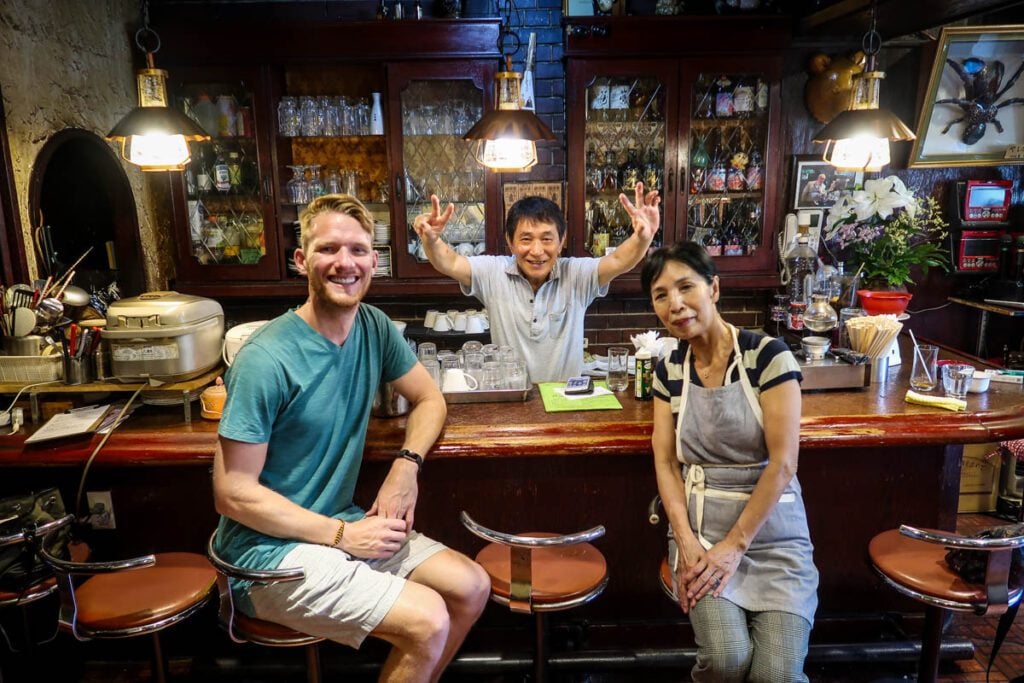
- I would like to check-in
- chekkuin shitai desu
- チェックインしたいです
- What time is check-out?
- chekkuauto no jikan wa nanji desu ka?
- チェックアウトの時間は何時ですか?
- Can you hold my luggage for me?
- Nimotsu wo koko ni oite itte mo ii desu ka?
- 荷物はここに置いていってもいいですか。
Phrases for shopping
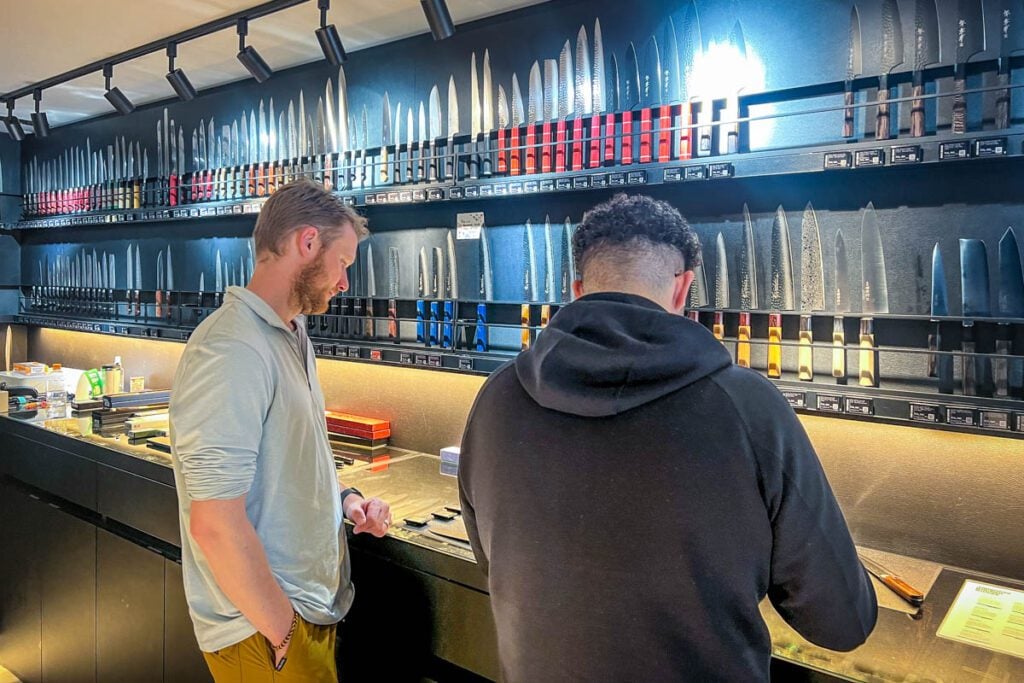
- How much does this cost?
- kore wa ikura desu ka?
- これはいくらですか?
- I would like to pay in cash
- genkin de onegai shimasu
- 現金でお願いします
- I would like to pay by credit card
- kurejitto kaado de onegai shimasu
- クレジットカードでお願いします
Other useful phrases
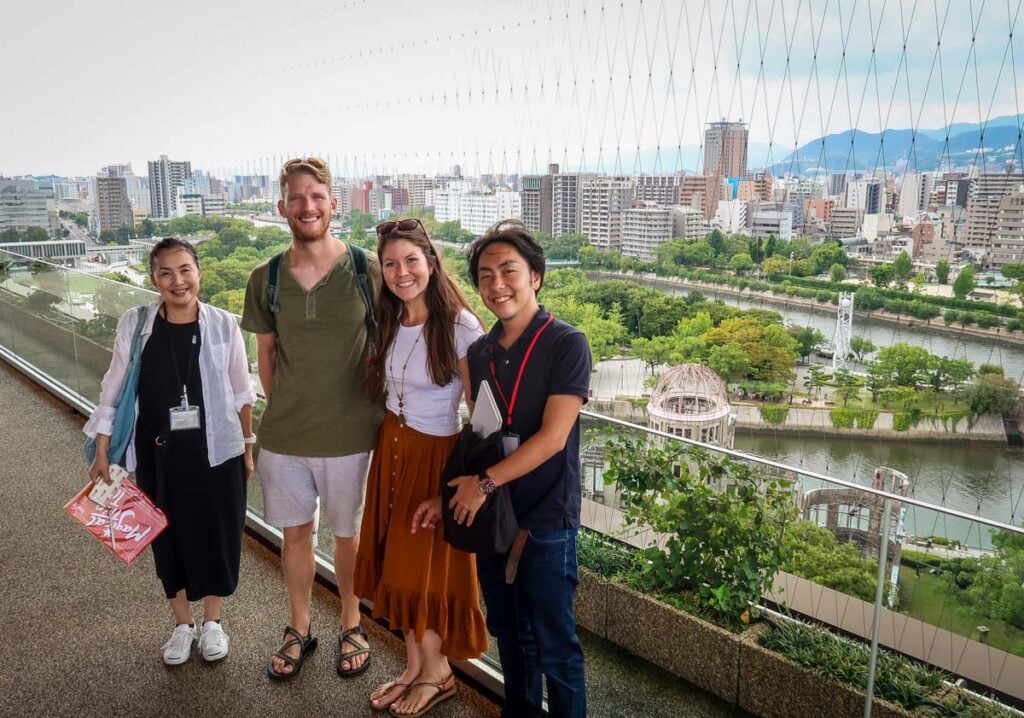
- Where is the bathroom?
- toire wa doko desu ka?
- トイレはどこですか?
- Do you have wifi here?
- koko de waifai wo tsukae masuka?
- ここでワイファイを使えますか?
Insider tip: You won’t need to ask for wifi if you have your own! We have a guide that breaks down Japanese pocket wifi and SIM card options to help you stay connected on your trip.
Numbers in Japanese
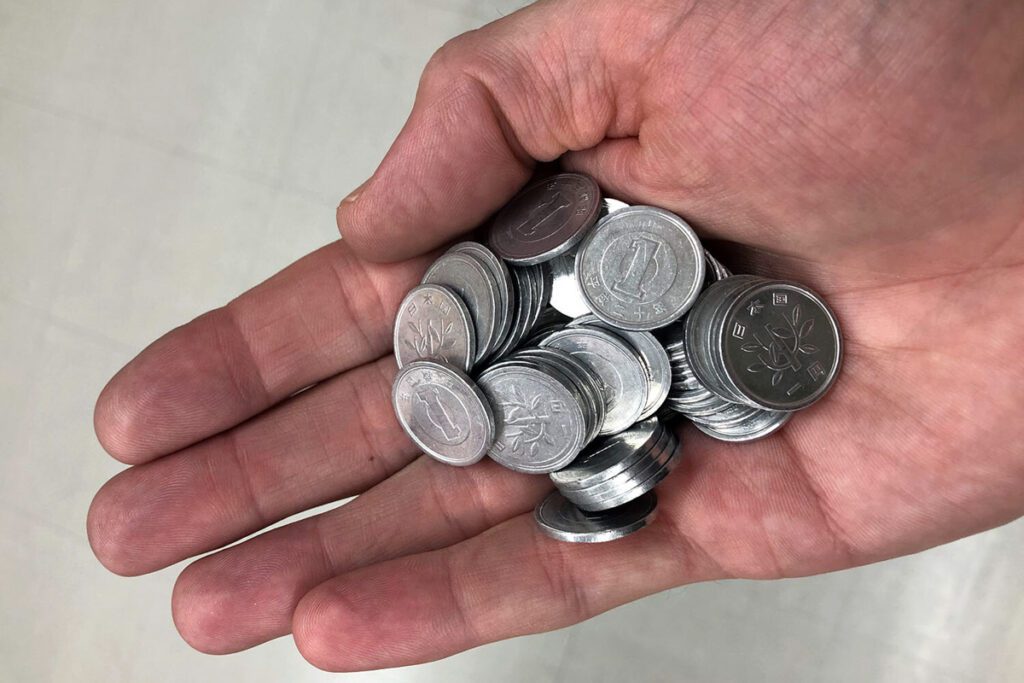
Depending on what you’re counting, Japanese numbers can be pronounced two different ways:
- Onyomi, or Sino-Japanese, is used for counting people, time, and money, as well as for any number higher than 10.
- Kunyomi is based on the Japanese native language. This system only goes up to 10 and is less commonly used than onyomi.
1-10 in Sino-Japanese
- Ichi (一)
- Ni (二)
- San (三)
- Yon or Shi (四)
- Go (五)
- Roku (六)
- Nana or Shichi (七)
- Hachi (八)
- Kyuu (九)
- Juu (十)
Counting money in Japan
Money is likely the only time you’ll need to deal with larger numbers while traveling in Japan.
The Japanese currency is yen, pronounced “en”. In Japanese, it’s written as 円 (after the number, as in 500円), while the international symbol is ¥ (before the number, as in ¥500).
Most of the time, prices will be written in Arabic numerals, but a basic understanding of numbers can help in conversation. Luckily, the basics are pretty easy.
See in the list above how 5 is go (五) and 10 is juu (十)? Well, to make 50, you just put them together: go juu (五十). Boom!
The same goes for higher numbers:
- 100: hyaku (百)
- 1000: sen (千)
- 10000: man (万)
Tips for communicating in Japan
Here are a few tips that we know from personal experience will help you communicate during your trip to Japan.
Google Translate is your best friend
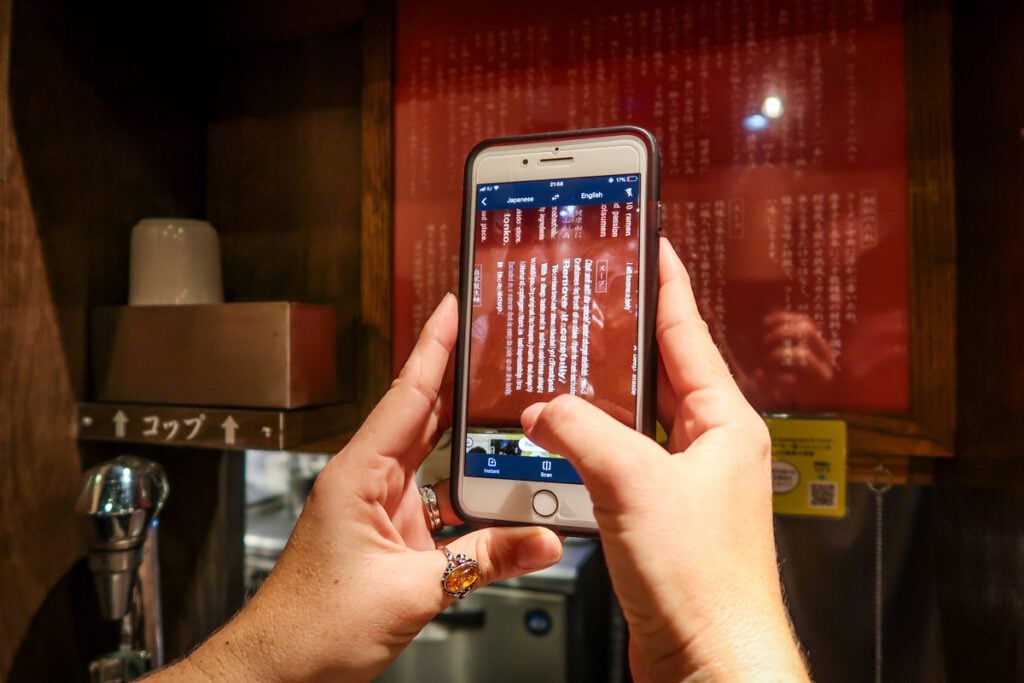
There are lots of “translate apps” out there, some specifically for Japanese. However, to keep things simple, we recommend downloading the Google Translate app and keeping it on your phone for easy reference.
Within Google Translate, you can download the Japanese language “package” to your phone so even if you don’t have WiFi or data, you can translate Japanese to English and vice versa.
When you are in WiFi or have data, one of the best functions of Google Translate is the camera feature that converts Japanese characters into English instantly in real time. It comes in handy when looking at restaurant menus, grocery stores, or street signs.
We even used the conversation feature when talking to a train operator. Ben talked into the app, and the app repeated what he said, but in Japanese for the operator to understand. We had a full conversation on where to go just by using the app!
Download the Google Translate App.
Practice with Duolingo
If you want to learn a bit of Japanese before or during your trip, you might want to consider downloading a language-learning app.
There are a ton out there, but we have used Duolingo in the past and prefer it over other language learning programs for a few reasons:
- It focuses on speaking and practical phrases (instead of on grammar), which are super helpful when traveling.
- They have many languages to choose from, so not only can you use this for Japanese, but you can use the same methods to learn Spanish, French, or whatever language strikes your fancy!
- It’s free!
Insider tip: Everyone’s learning style is different, so we’d recommend you browse a few different language-learning apps, download them, and try them out a bit. Once you’ve determined which app works best for you, delete the rest so you can focus on one.
Download the Duolingo App.
Try your best
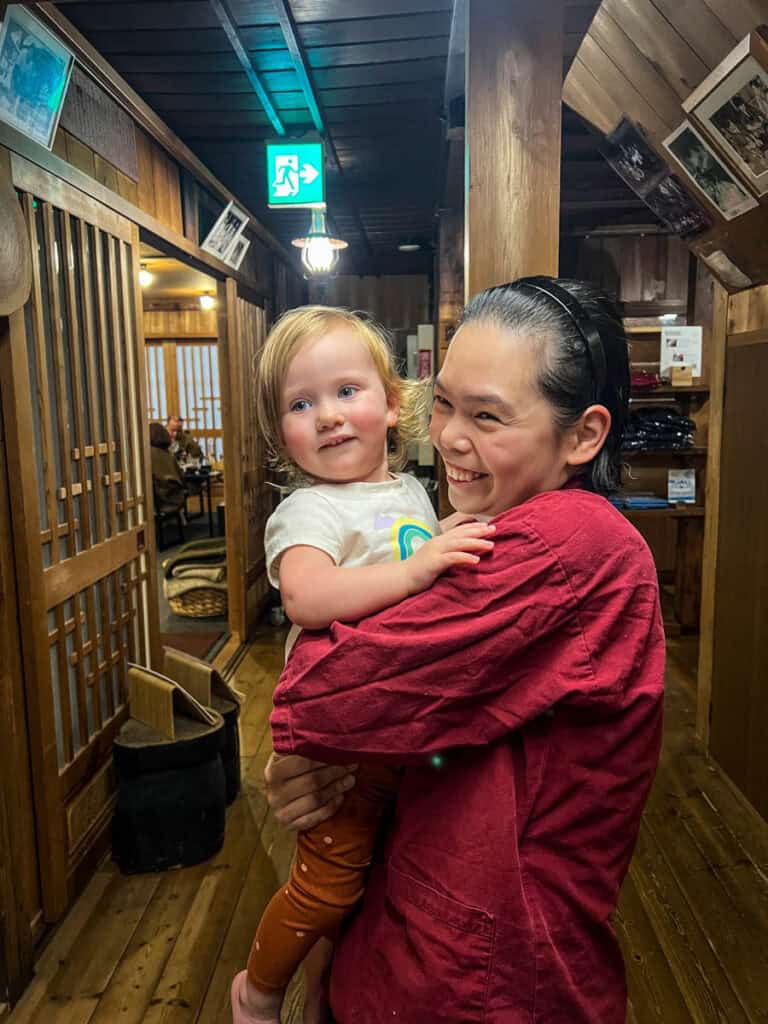
Language barriers can be intimidating. Trust me, I get it.
But a little effort can go a long way.
In our experience, most locals appreciate when foreign visitors attempt to speak their language. (And Japanese people are generally very nice and polite!) Even learning a few basic words in Japanese will show you’re trying.
Be patient
Nothing makes us cringe more than an entitled tourist.
Remember that you are a guest in another country, and while some people may know a bit of English, it is not their first language.
Don’t expect everyone to speak English, and don’t get frustrated when someone doesn’t understand you.
Use body language
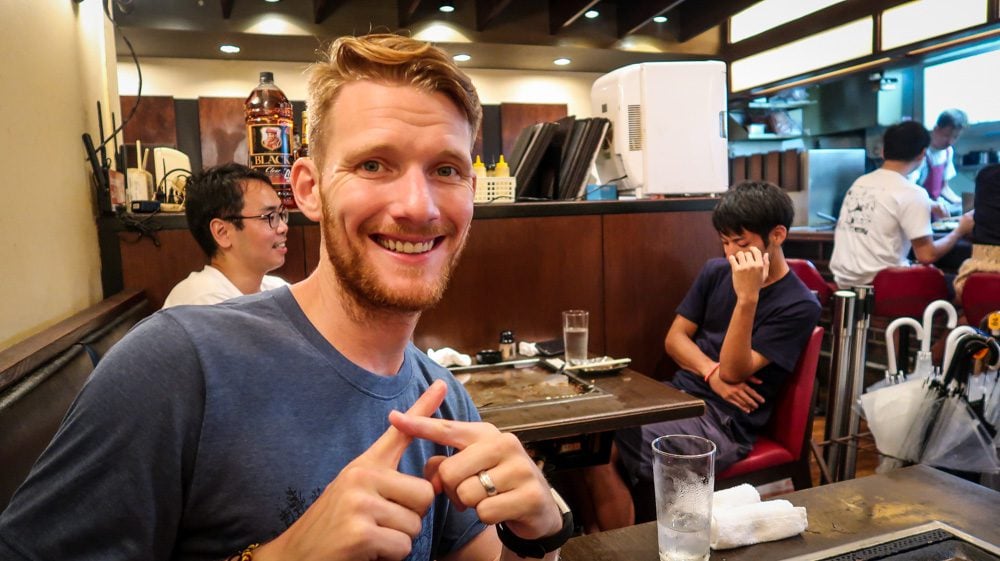
This one might seem like a “duh!” moment, but gestures can help illustrate your point if you get really stuck.
Just know that pointing is generally frowned upon in Japan as it can be perceived as impolite or even aggressive. Instead, use an open hand to make gestures.
For more tips, check out our Japanese etiquette guide!
Japanese language FAQs
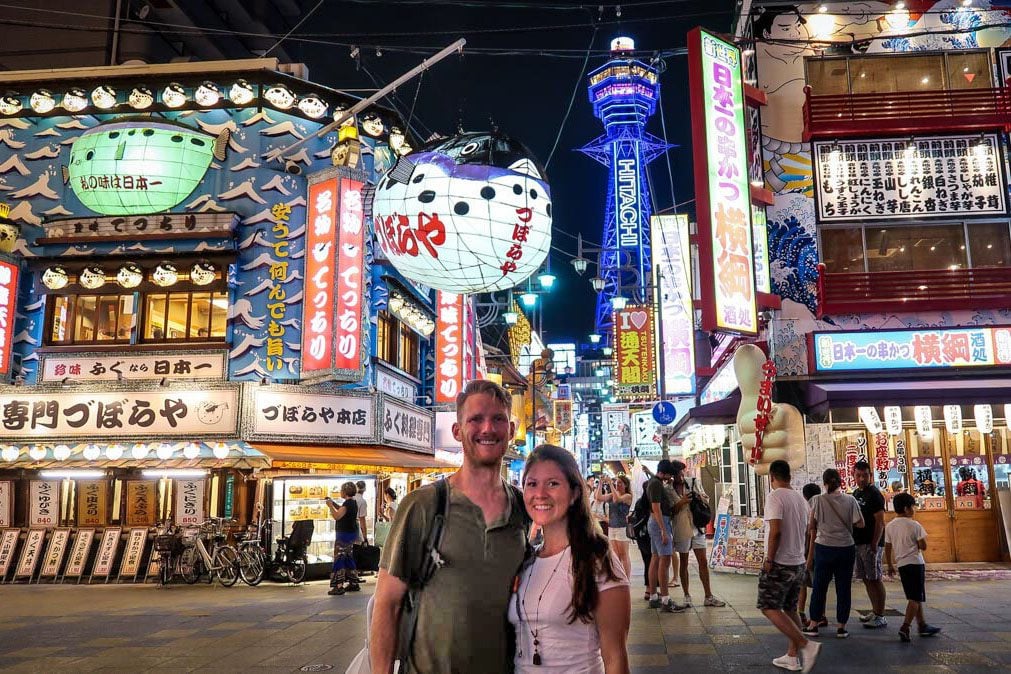
Do people speak English in Japan?
Some do, but not everyone.
Whenever traveling to a place where English is not the native language, we don’t expect people to speak English. As visitors, we’re the ones who should make an effort to communicate in the native tongue.
That said, a lot of people in the major cities, like Tokyo, Kyoto, and Osaka, do speak some English. Plus, people who work at hotels typically speak some English, and many people who work at restaurants speak a few English words (at least relating to food), so that helps a lot.
In general, more rural areas are where you’ll find less English. But don’t let that deter you from visiting, as these have undoubtedly been our favorite places in Japan.
You’d be surprised by how far a handful of words and some gestures coupled with some help from Google Translate can get you! These types of conversations often lead to really sweet and memorable interactions with locals, so don’t be shy.
Why do Japanese say “san” after someone’s name?
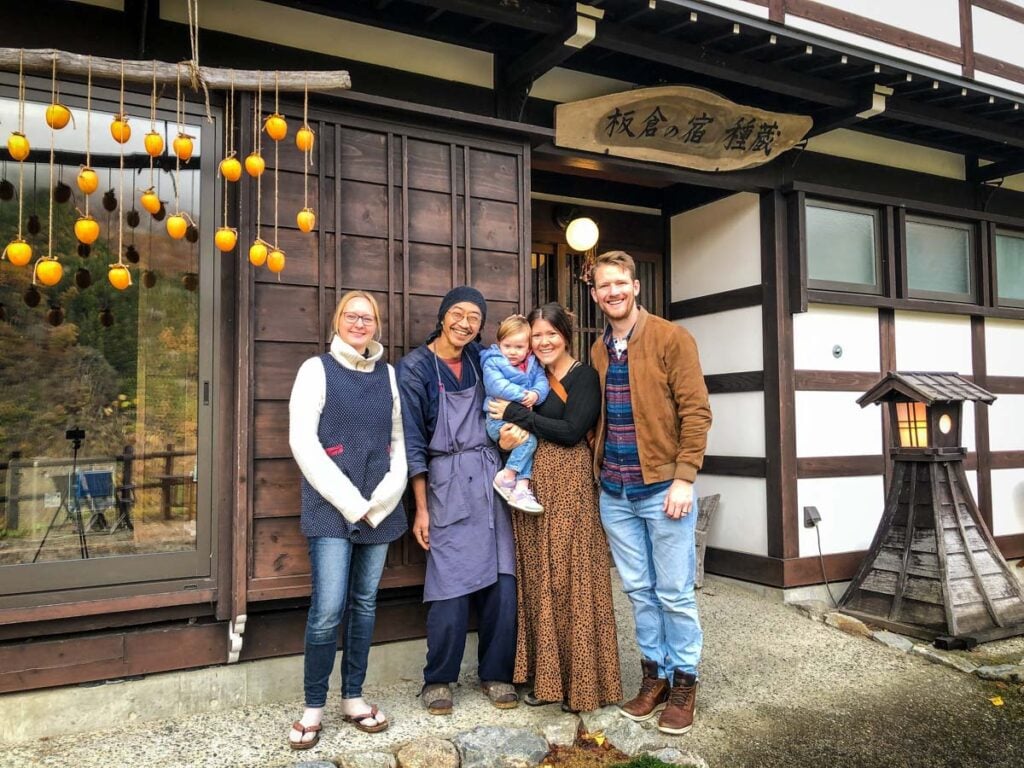
The honorific suffix –san(~さん) in Japanese can be added to the end of a person’s name as a sign of respect.
This could be compared to Mr/Ms in English, but –san is gender-neutral and could follow someone’s first or last name, as well as their title or profession.
What’s the difference between Kanji and Hiragana?
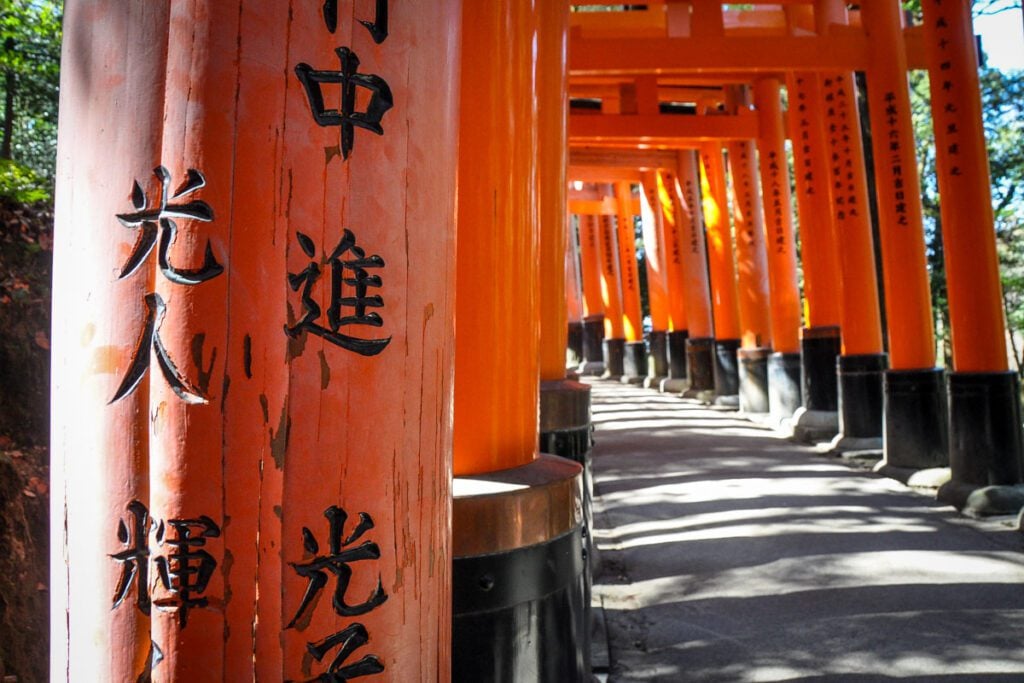
Kanji and hiragana are two ways of writing in Japanese.
Hiragana is unique to the native Japanese language. This way of writing is phonetic, with each hiragana character representing a sound or syllable which are strung together to form words.
On the other hand, kanji are Japanese adaptations of Chinese characters. Similar to hiragana, kanji with different meanings can come together to form a new word. For example, the word “karate” comes from the kanji kara, meaning “empty”, and te, meaning “hand”.
Why are some numbers unlucky in Japan?
When in Japan, you might notice that a lot of elevators don’t have a button for the 4th floor, or that items in Japan aren’t priced at X.99 like they are in the States. This is because the numbers 4 and 9 are considered unlucky.
The reason for the superstition is that these numbers sound similar to some rather grim words.
For example, the number 4 pronounced as “shi” (四) shares the same sound as the Japanese word for “death”. So it’s better to pronounce the number 4 as “yon”.
Similarly, the number 9, “kyuu” (九), sounds close to the Japanese word for torture and suffering. Unfortunately, there isn’t another way to pronounce the number 9 in Sino-Japanese, so try to avoid saying it if you can.
Japanese words that don’t have an English translation
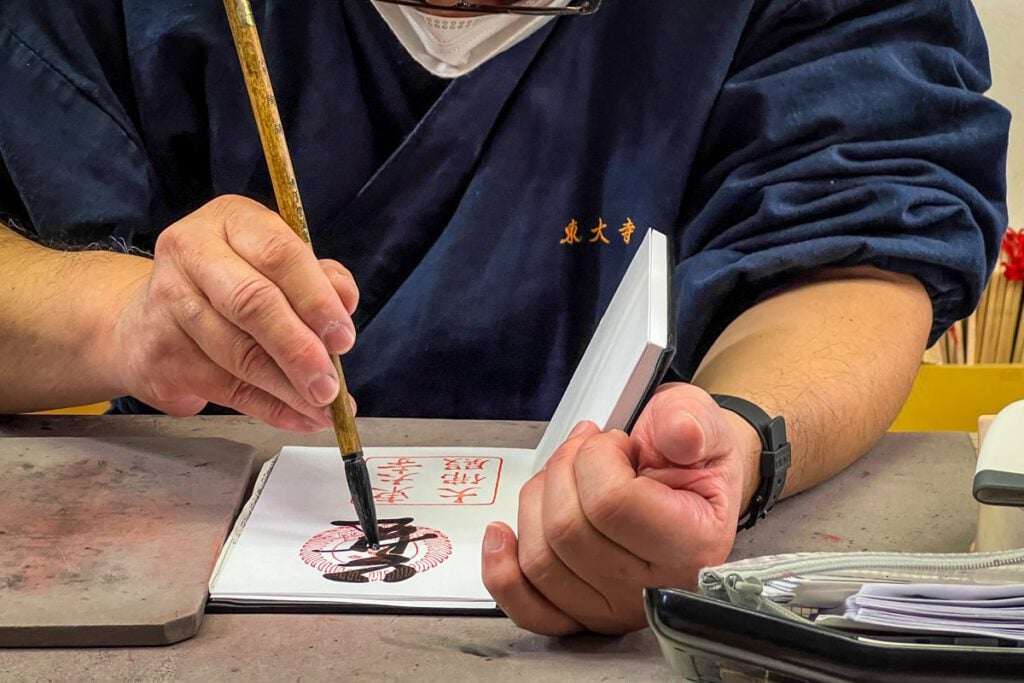
Have you ever noticed that there are words in other languages that don’t have a translation in English? We love stumbling upon these words so much that we even made an entire article dedicated to them!
The words in this section won’t necessarily help you in your travels, but we think they are so beautiful that we wanted to share.
Satoyama
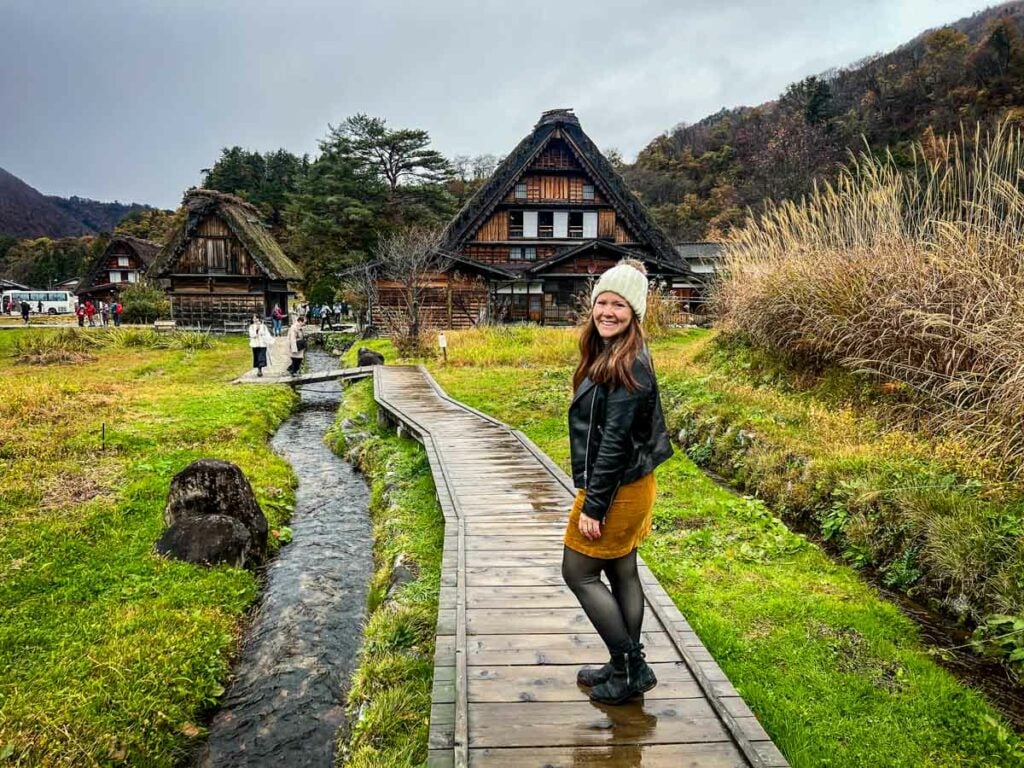
This phrase can be used to describe a place where nature and humans coexist. It often refers to rural villages surrounded by the natural world (rice fields, mountains, forests, and ponds). One place that comes to mind for this description is the traditional Japanese village of Shirakawago, which is located in the Japanese Alps.
Hanafubuki
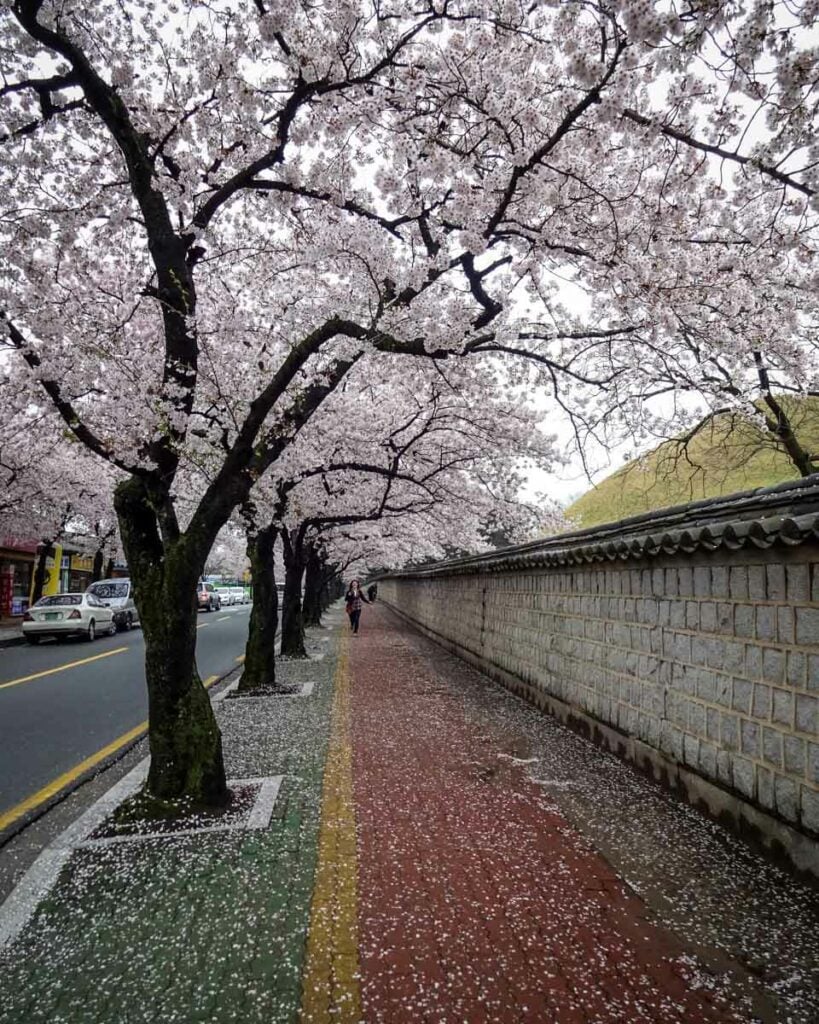
If you’ve experienced the famous cherry blossoms in Japan, you’ve probably witnessed hanafubuki – the magical “flower snow storm” that occurs when delicate pastel petals are carried by the wind, resembling a soft flurry of snowflakes.
Hanagasumi
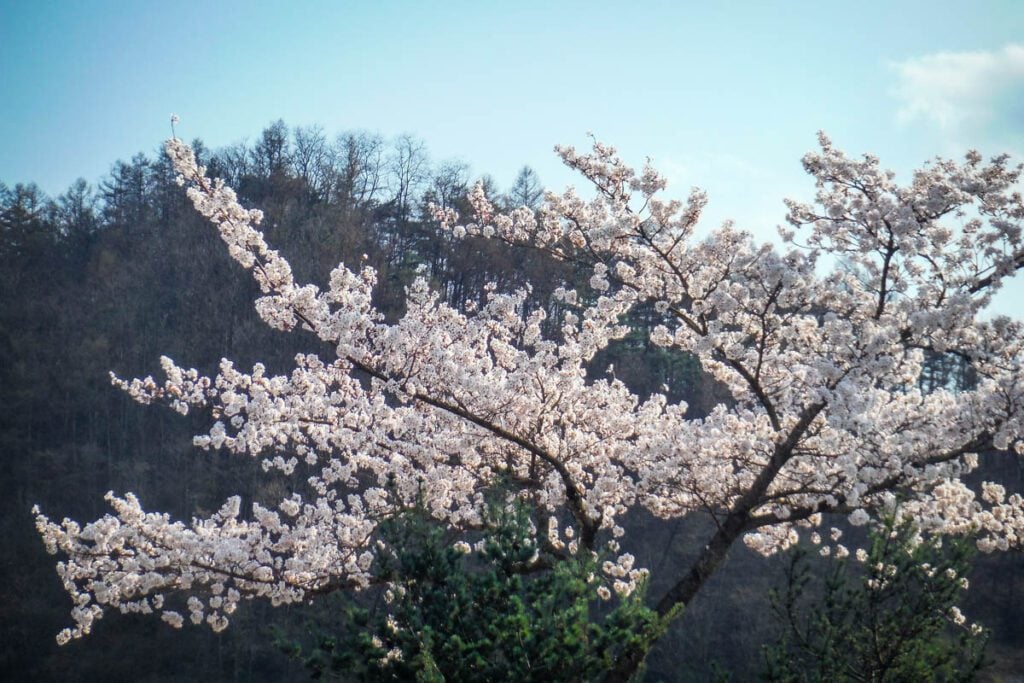
Another sakura-themed term, hanagasumi or “a hazy curtain of flowers” describes the way cherry blossoms resemble clouds from a distance.
Komorebi

With the beautiful translation of “sunlight is leaking through the trees”, komorebi describes soft, dappled sunlight filtering through the trees.
Kyouka Suigetsu
Poetically translating to “flower in the mirror, moon on the water”, this is used to refer to things that can be seen but not touched, or things that can’t be described with words.
Fuubutsushi
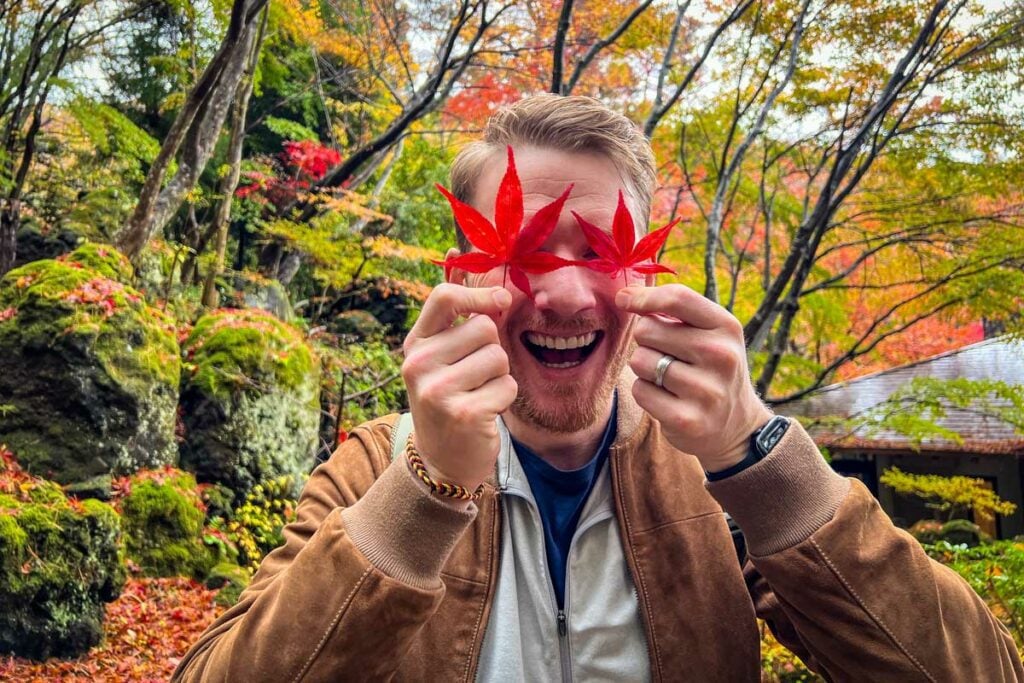
This is a seasonal tradition or something that reminds you of a particular season.
Kuidaore
Okay, this one isn’t exactly beautiful or poetic, but it’s pretty funny. Kuidaore means “eat until you become bankrupt”. So if you’re a big foodie like us, you might relate to this one!
Fun fact: Famous for its street food, Osaka is nicknamed “kuidaore no machi”, or “town where people eat until they are bankrupt”.
Kuchisabishii
With a literal translation of “lonely mouth”, kuchisabishii can be used to describe what I like to call “snacky” – when you’re not hungry but you’re in the mood to nibble on something. But your mouth can also be lonely for things other than food, like a smoker yearning for a cigarette.
Tsundoku

This term refers to a person who keeps buying more books, even if they haven’t read the ones they already have. If e-readers count, then I’ll raise my hand for this one!
Are you planning a trip to Japan?
We have TONS of resources on travel in Japan and destinations throughout the country. Check out our Ultimate Japan Travel Guide for all the answers to your most burning questions, or read some of our favorite articles below!
- Best Time to Visit Japan: When to Go & When to Avoid
- Japan Rail Pass: Where to Buy & Is It Worthwhile?
- Renting a Car in Japan: Essential Driving Tips You Need to Know!
- Japan Travel Cost: Exactly How Much is a Trip to Japan?
- Expert Tips for Visiting Japan (Dos and Dont’s!)
- Foods to Eat in Japan: Guide to Japanese Cuisine
Want the perfect itinerary planned for you?

If you don’t have a ton of time to spend planning your Japan itinerary (or you just don’t find travel planning fun), we’ve got something you might be interested in…
We created the ultimate done-for-you Japan itineraries that are packed full of all sorts of tips we’ve gathered from 3 trips to Japan as well as literally hundreds of hours of research (no exaggeration).
We will have both off-the-beaten path routes as well as a classic itinerary that hits the top attractions (perfect for your first visit to Japan!).
Click above and we’ll send you our complete 2-week classic Japan itinerary, filled with tips and advice, including the highlights of Tokyo, Mount Fuji, Osaka, Kyoto and more!
If you want to be the first to know when our Hidden Gems itinerary is on sale, get on the waitlist!
Japan Packing List
Be sure to download our complete packing list for Japan! It’s packed with good suggestions and insider tips to help plan your Japan trip. And it’s completely FREE, so why not!?
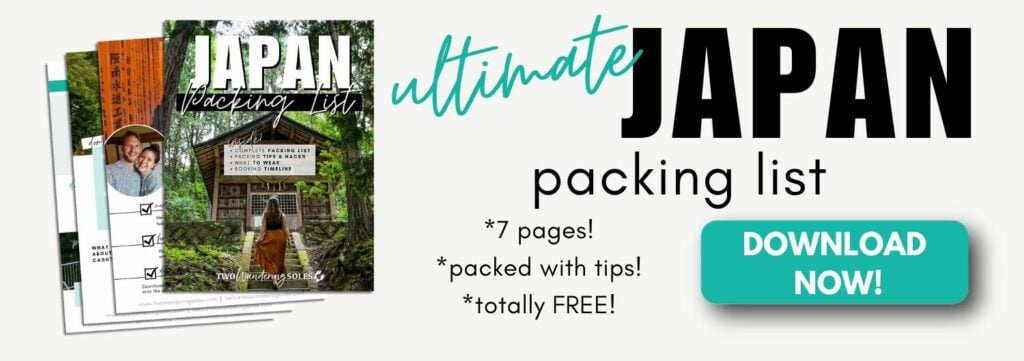
Save this article on Pinterest for later!
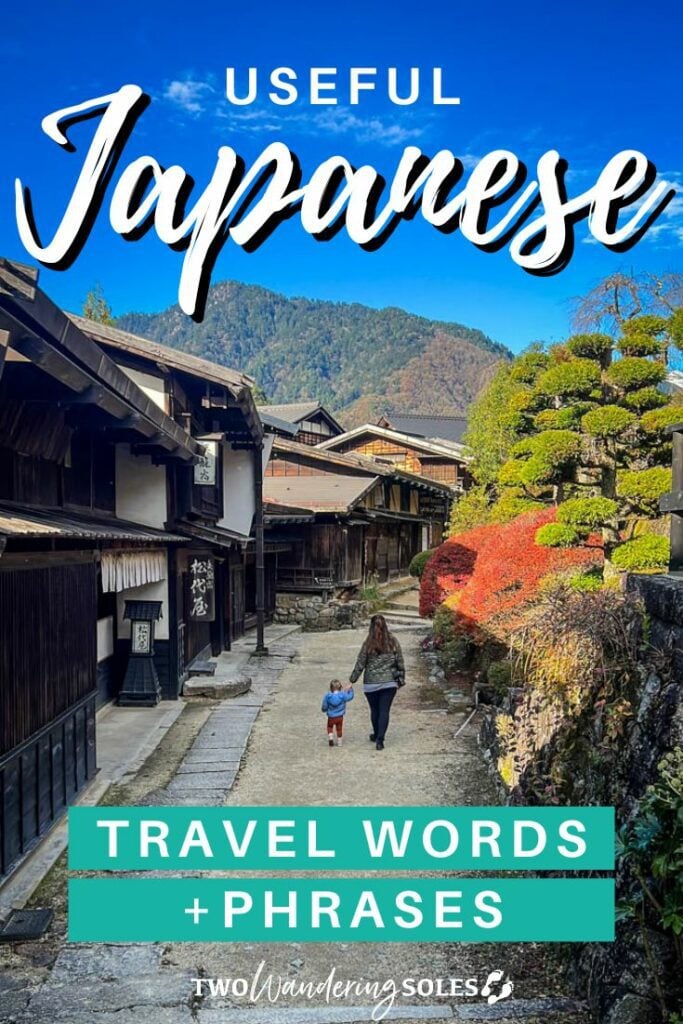
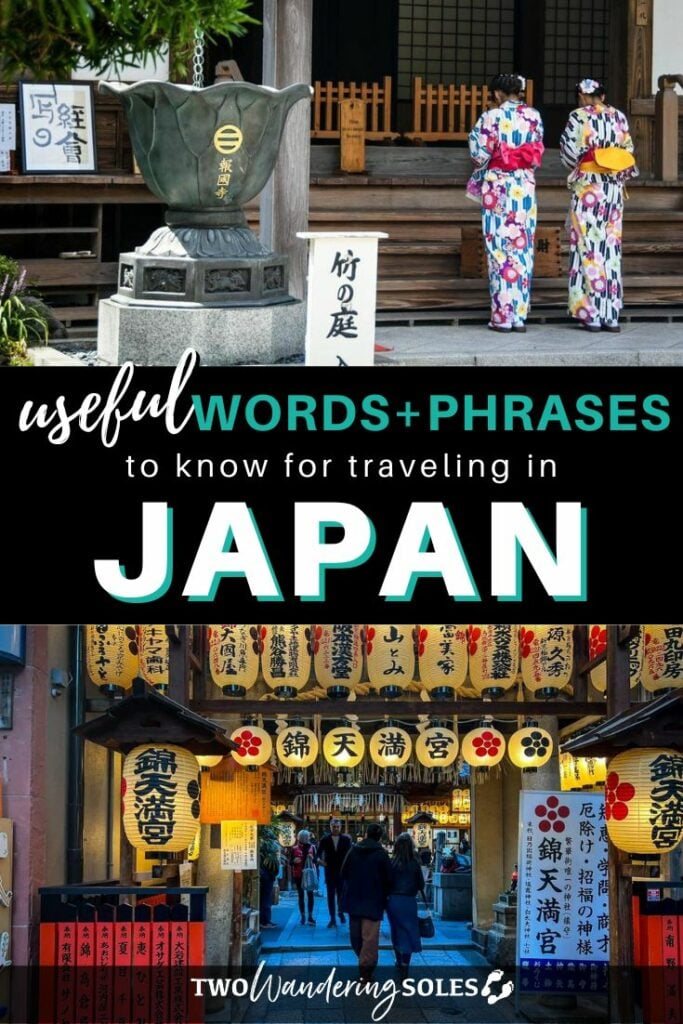
We want to hear from you!
Do you have questions about communication or the language barrier in Japan? Any important-to-know words or phrases we missed? Let us know in the comments below and we’ll do our best to get back to you!

Thank you, I am going on a cruise in October with 15 stops in Japan, then spending 4 days in Tokyo. My adult son will join the cruise in Yokohama, he is a foodie & a beer coinsure, so we should have a lot of fun.
I was in Tokyo for 1 week 56 years ago when the yen was 350/$1 USD & I was a lot younger.
I have found your suggestions very helpful, especially since we will be staying very near “Ramen Street”.